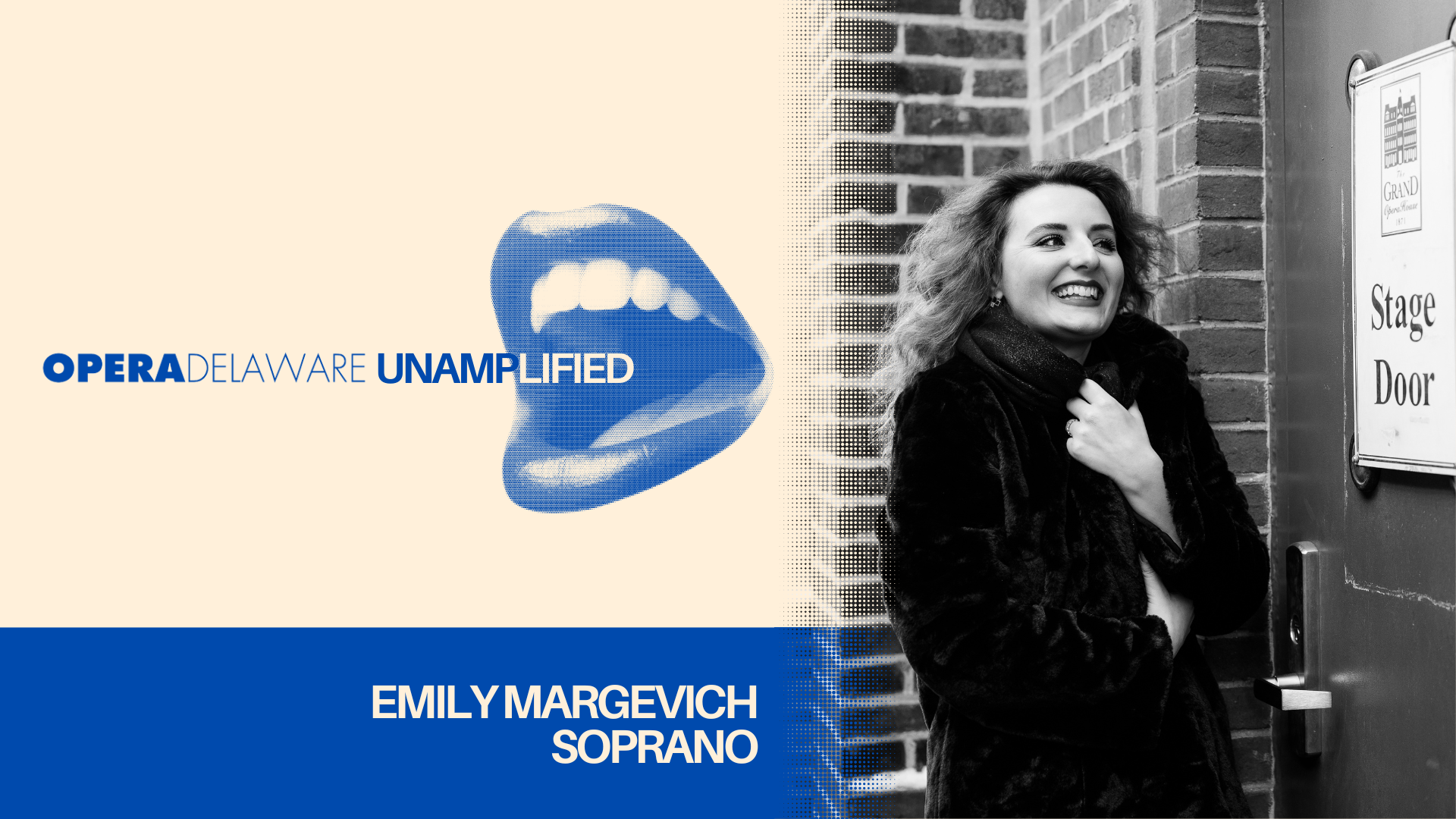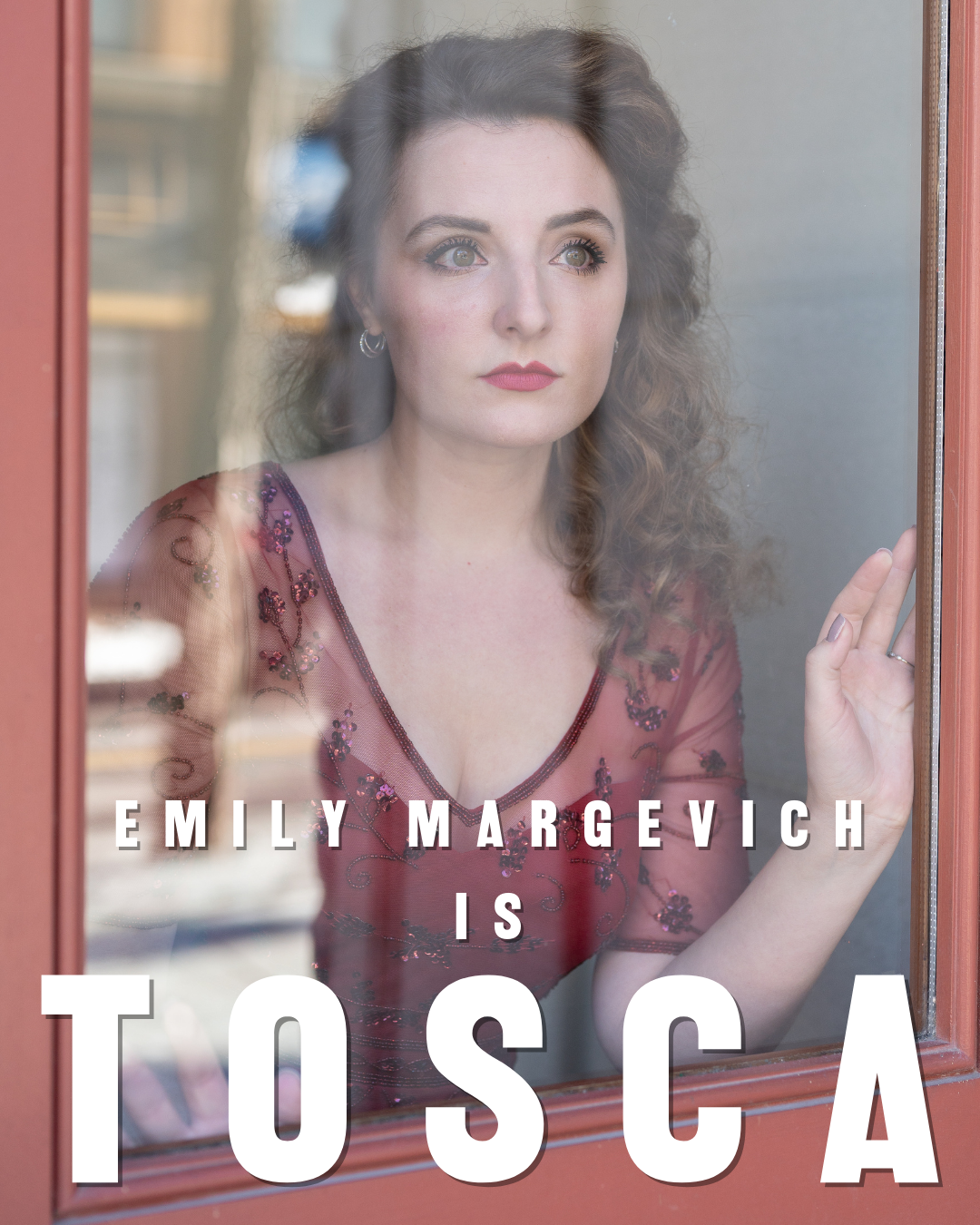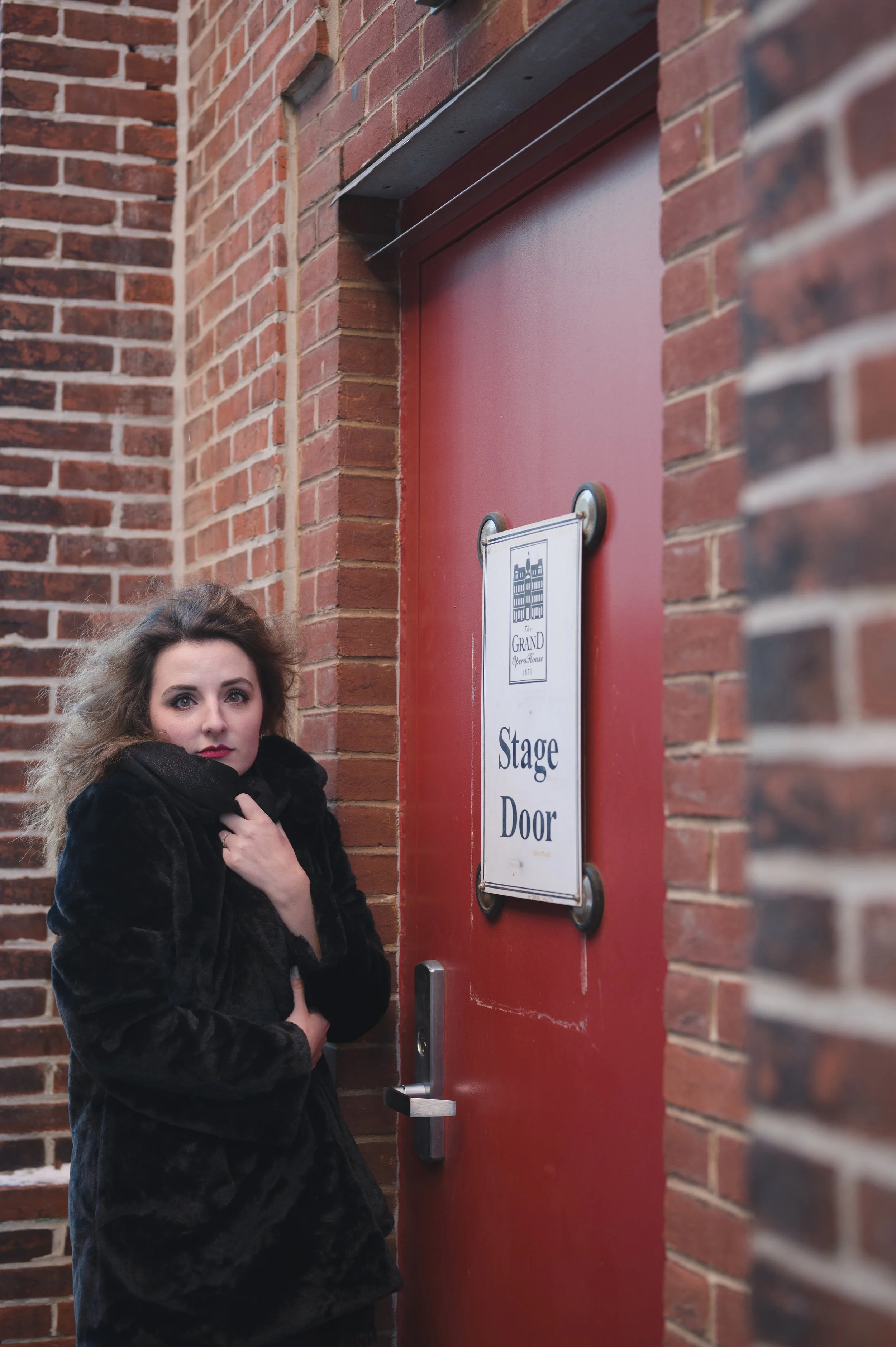Becoming Tosca: Emily Margevich on Faith, Love, and Finding Her Voice
/photo by meghan newberry photography
Kerriann Otaño: As someone who worked on Tosca myself as a singer, I know how monumental this role feels in a soprano’s life. It isn’t just another Puccini heroine — it’s a milestone, a proving ground, and a deeply human story that asks everything of an artist’s voice, spirit, and soul. Watching Emily Margevich, one of our inaugural OperaDelaware Company Artists, step into this role has been extraordinary.
Emily previously sang Musetta for us, she’s created new work in Fearless, and she’s poured her artistry into recitals and pop-ups across our state and in our community. This fall, she makes her role debut as Floria Tosca — a character who is at once a diva, a lover, a woman of faith, and a fighter.
I had the chance to sit down with Emily and talk about what this journey has meant to her. Her answers are raw, heartfelt, and full of insight into why Tosca continues to move audiences 125 years after her creation.
emily margevich as musetta (la bohème) photo by joe del tufo
KO: Emily, what makes Tosca such a milestone role for a soprano?
Emily Margevich: Great question! I believe I’ve been fortunately—and perhaps naïvely—so excited and focused on becoming Tosca that I haven’t often thought about this role being such a role of arrival in one’s status in our opera industry and on our stages. I’m so beyond proud and thankful this is happening to me that I’m still a little shocked it’s real!
Tosca is such a heroine. This opera is so beloved. The gravity of singing opera is our daily connection to the past. This music has been sung by all the divas. Tosca herself is the diva. The role demands a level of acting depth and vocal stamina that doing both well all night long has earned it the right to be a milestone role. You can all tell me after the last show if I got close to achieving this badge of opera honor!
KO: How does stepping into this iconic character differ from other roles you’ve sung with OperaDelaware before?
EM: I’ve never been the title of an opera. The closest I’ve had so far was being half of Hansel und Gretel and half of Roméo et Juliette. It’s cool to be the entire title!
With OperaDelaware, I sang Musetta last fall and had a featured role in our world premiere of Fearless. (I’ve never played anything like the role I played in Fearless. I considered myself the villain in Fearless, and sopranos are rarely—if ever—anything close to villainous!) Musetta and Tosca are both singers and performers, and they’re both Puccini girls. They’re both very confident people, they love intensely, the word “jealous” is never far from their atmosphere, and they’re very smart.
Juliette was my first most challenging role—the length of being on stage the entire time; Violetta [in La traviata] was difficult in similar ways. Tosca feels very familiar to me in my person, my body, and my voice. I’ve had to learn the role faster than I’ve had to learn other roles just given my singing schedule, but it sunk in with a secure depth. Tosca has opened a door in my mechanism similar to Tatyana [in Eugene Onegin], but much more dramatic, more mature, and the emotional stakes are so high that the music is powerful and all-encompassing.
photo by meghan newberry photography
KO: Share your personal feelings about being trusted with such a monumental role at this stage in your career.
EM: Trust is the word. Brendan and Julia [OperaDelaware and Opera Baltimore General Directors, respectively], Toni Marie [OperaDelaware Company Artist], Gerard [OperaDelaware Company Artist], and you and Dane [OperaDelaware Company Artist] really believe in me and tell me so often. I’ve always had a strong resilience for my opera career, as I love singing and feel fortunate I get to experience music personally in this way.
Doing the Puccini Portraits program with Husan [pianist/composer/arranger], John [Cavaradossi in Tosca], and Steven [Scarpia in Tosca] was a true gift. With their loving support and friendship—and having the opportunity to sing Tosca scenes in so many different venues around our community—I was given invaluable playtime to explore my Tosca for and with an audience before official rehearsals started.
I feel so grateful and deeply blessed to sing my dream role this year. No job, no “win,” no external validation will ever shake or change the way I love, need, and respect singing as a spiritual communion that I regard as sacred for myself—which is very much how Tosca feels. Thanks to the Company Artist program, I get to live for art and for love every day.
"Vissi d'arte, vissi d'amore"
KO: How has exploring Tosca—and your role as an OperaDelaware Company Artist—deepened your artistry or changed the way you see yourself as a performer?
EM: This role has deepened my humanity. My personal want for my life. The word spirituality. My health struggles. The “why me” that we all unfortunately have asked, no doubt. Why did I get sick at this important moment? Why God or universe did you grant me such a special beautiful gift of my singing voice only to be subjected to the worst pain? The most heartbreak? The deepest struggle?
The poem of Vissi d’arte—the “why”—unfortunately I’m sure we’ve all been there once or twice. Why me? What am I supposed to do? I don’t feel like I deserve this treatment. What’s the lesson? Vissi d’arte is the lesson, and vissi d’amore is the purpose.
KO: That’s so powerful, Emily. I think every artist who has stood in front of an audience has felt that push and pull between pain and purpose. When you talk about Vissi d’arte in that way, it sounds less like an aria and more like a prayer.
photo by meghan newberry photography
EM: My mom and I always debate that “everything happens for a reason” quote. I love it and use it. She brings up valid arguments against it. But for me, by the end of Act II, my Tosca sees a bigger picture—committing an act so unbelievable that perhaps, for the good of the people, to honor in a way her Mario and the ones who fight for what they believe in, sometimes someone has to, unexpectedly, checkmate. Going beyond personal dreams and realizing the fragility of life we all are living. For whom are we living?
This question opened the floodgates for my exploration of becoming Floria. The last three years of my life have brought the biggest changes, challenges, and the most beautiful clarity of perspective.
I’ve grown to understand and find deeper faith without bitterness or defeat, rather to find real peace in the unknown future. Knowing life doesn’t happen as you may have thought, planned, or even wished. Pain makes room for other love—a healing love, a lasting love, a true love that turns your world around and reminds you how fragile life is.
KO: You’ve lived so much of what Tosca wrestles with in just 24 hours of opera — faith, love, sacrifice. Do you feel like your own life experiences have made you more ready for her than you would’ve been a few years ago?
EM: I always scoffed when people would say, “You should travel the world to really be an artist and sing these roles” or “you’ve gotta live and have experiences to play these characters well.” I’m of the opinion of Sir Laurence Olivier—it’s called acting.
However: perhaps my disdain for such comments is because that seems obvious. Of course the more you know, the more you live, the more you’ll have experienced the highs and lows of what it means to be alive. But knowing Dylan Gregg (my fiancé — find him at the show, he’s the most handsome man there so you’ll know him!) and loving him as I do, it certainly makes acting easier… and at times harder! I’m not a method actress, no one be alarmed (haha) but there’s so much of Tosca in me already.
Examining how she handles Act II hasn’t changed my artistry, but it has allowed my artistry to be changed when I put it in the lens of what’s most important in my life. Through Tosca’s journey, I see echoes of the last three years of my own life. Not nearly as dangerous or dramatic, but there are similarities — courage, questions, sacrifice — willingly given when perspectives change.
KO: That’s beautifully said. I love the way you connect Tosca’s faith and resilience to your own.
EM: Tosca continually says, “God, give me the strength to know what to do.” In her famous aria, she is directly speaking to God, asking why this suffering has entered her life. For someone as devout as Tosca, the act of killing is unthinkable — yet she kills the killer. Who did she kill him for? For Mario, for love, for her faith. I mention faith, God, and spirit so often because Tosca does. Her faith is her complete and only compass. Within that faith, she loves Mario, but her faith is also the guiding force behind every decision she makes — even her love for her career. Tosca lives and dies by her faith.
photo by meghan newberry photography
I think one of the opera’s themes is that people in power cannot be allowed to take away your faith, your mind, or your heart. They may wound you, they may test you, but true belief — whatever it may be — cannot be broken. That’s how I view Tosca. No one human has the right to claim that kind of power over another.
I, too, ask “why me?” sometimes, but then I get back up and remember that I trust myself and my path. Why is Tosca hurt so irreversibly? No loving source could have led her to such a fate. Yet if we choose not to hurt others — in word or in deed — then her story becomes a cry for peace on earth. At the end of Act II, without giving spoilers away, her last text examines not only the severity of political forces and power struggles, but also the hierarchy that exists in every human situation. It reminds me of Tevye in Fiddler on the Roof, when he rejects “an eye for an eye.” As he says: if we lived that way, the world would be blind and toothless.
For Tosca, there is self defense, but more importantly I think there is making the brave choice to support Mario in a cause he’s willing to give his life for, and in a way Tosca shows her support of Mario by doing what she does in act 2. The opportunity to join the fight and believe in the hope that she could save her love’s life, and fight for her own pure life. How do any of us know what we would do in any life or death situation? To hear what she hears in act 2 and be faced with the one who caused her beloved so much pain. Her beloved. God and Mario. The pain of a suffering world.
I love audiences so much because it is for you all that we have the ability to tell these stories and share this moment and content all together. We already agreed to go on a journey together when the house lights dim. You don’t have to believe in what Tosca believes to experience, enjoy, support, wonder, attend, applaud, question, value, or be inspired by this story. That’s what art is all about. That’s it’s function. Through stories, we can see ourselves, see our heroes or our enemies, be reminded of our own personal values whatever they may be.
I guess we can have a post performance blog so I don’t give any spoilers away!
KO: Emily, thank you for sharing so much of yourself — your faith, your struggles, and your heart. What you’ve given us here is exactly what makes Tosca timeless: the humanity inside the heroine. You remind us that opera doesn’t just live on the stage — it lives in the questions we ask ourselves, in the strength we find in our own lives, and in the way music can carry us through both joy and heartbreak.
We can’t wait for audiences to experience your Tosca this October and to take that journey with you!






